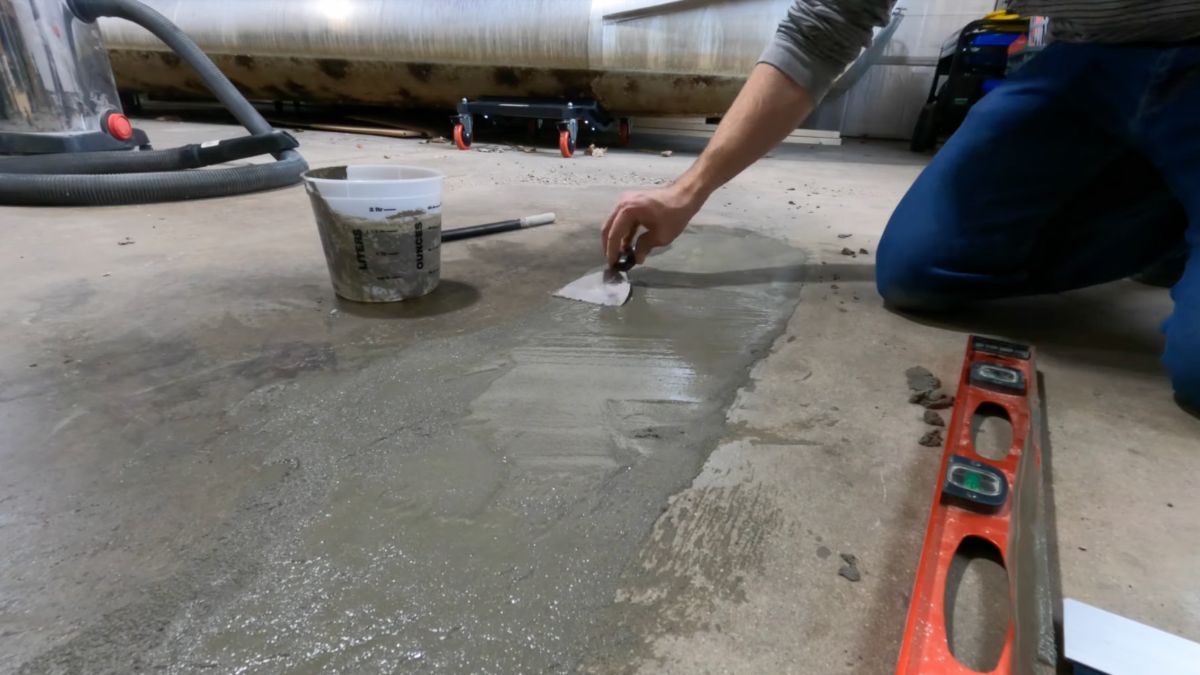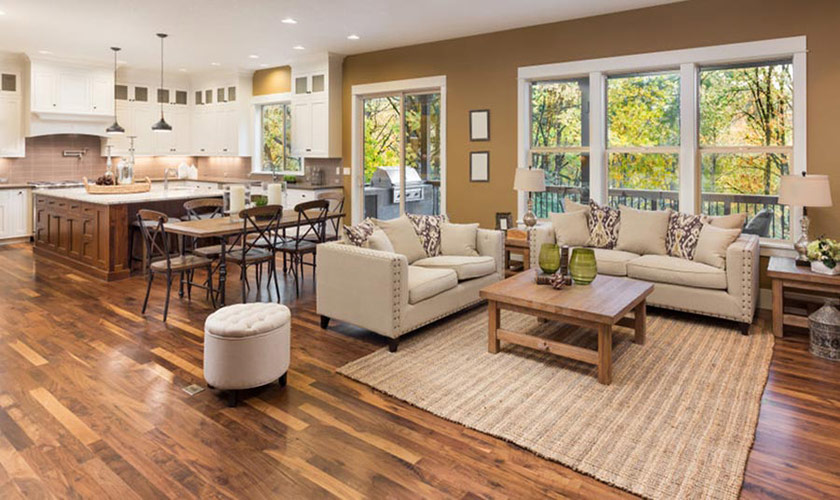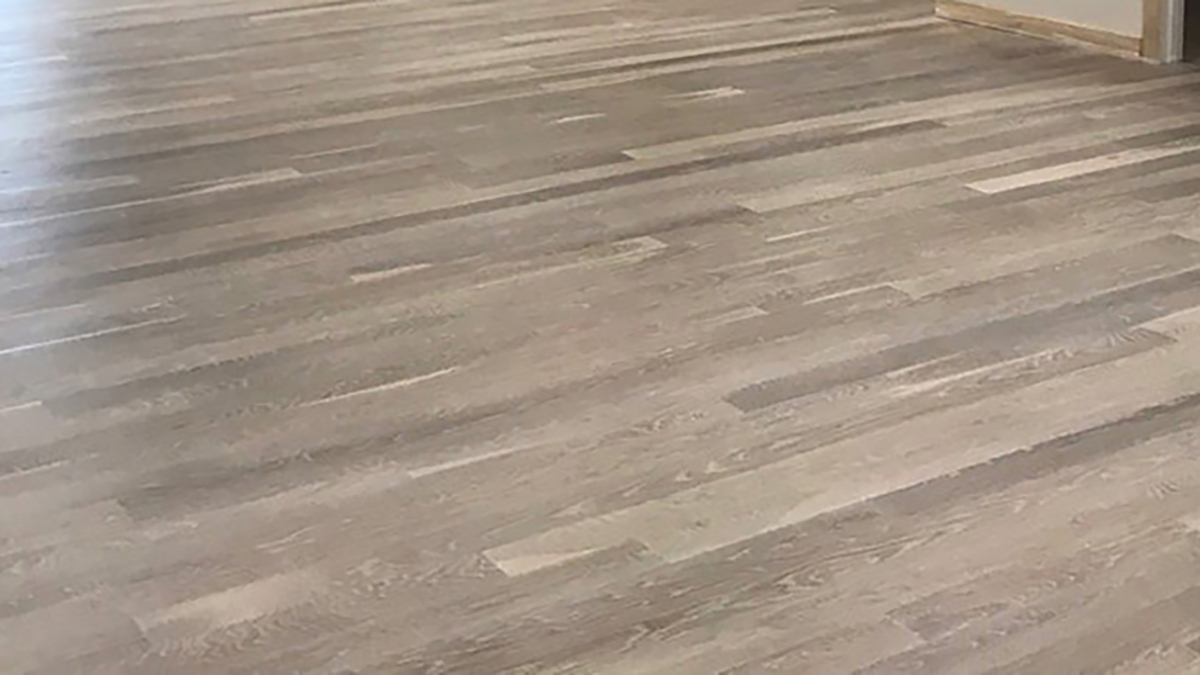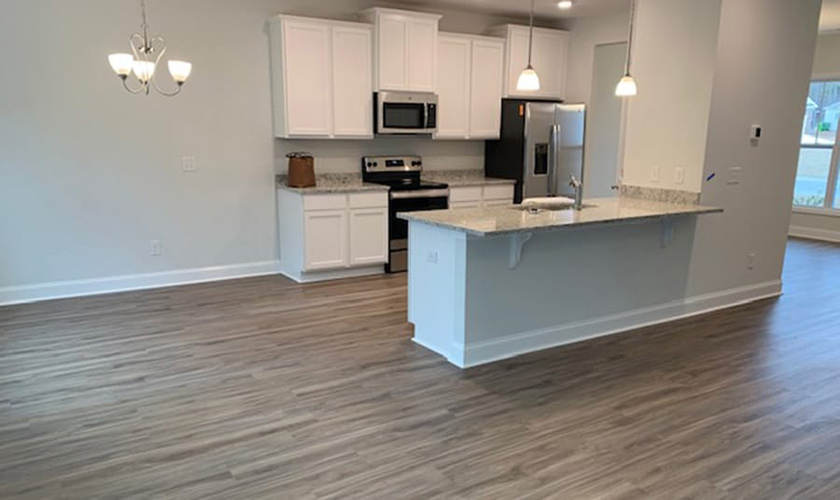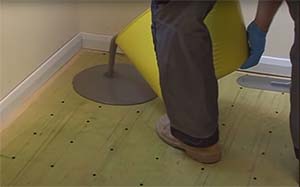Are you considering using luxury vinyl plank flooring (LVP) for new flooring? We look at the advantages and disadvantages of LVP flooring options. It’s important to note how vinyl plank flooring has evolved since the 1970s. You can get luxury vinyl plank flooring that looks like hardwood but costs less.
There are many pros and cons of vinyl plank flooring. LVP flooring is popular because it is durable, easy to install, and resembles hardwood. One of the essential qualities is luxury vinyl flooring is waterproof. There are a few drawbacks to this flooring. It can fade in sunlight and is difficult to uninstall. Additionally, its lifespan is only 10 to 20 years.
Vinyl plank flooring has advantages and disadvantages, but it is one of the best choices. I am confident that you will have your mind made up about whether vinyl plank flooring is right for your home. Now, let us go into more detail on what I mean below.
What is Vinyl Plank Flooring?
Vinyl plank flooring comes in long, narrow planks instead of square tiles or sheet vinyl. However, there are a couple of vinyl plank flooring to consider. Here is a rundown of what each one is:
- Luxury vinyl plank (LVP): Floating luxury vinyl plank flooring is durable and great for handling pets and children in busy areas. The flooring has layers of vinyl, a wood design layer, and a transparent wear layer. The flooring planks are flexible and easy to install. These floors don’t need glue or padding and can be installed over any surface (except carpet).
- Luxury vinyl tile (LVT): LVT flooring is made from the same material as LVP flooring. The squares are cut, and the design layer resembles natural stone or ceramic tile.
- Stone Plastic Composite (SPC): SPC vinyl plank flooring is made from stone plastic composite. It has the same qualities as mentioned before. The main difference is that the core is made from powdered limestone, polyvinyl chloride, and stabilizers. This installation is click-type and doesn’t need glue, so it’s very easy to install. It has become popular. SPC is similar to wood laminate flooring because of its rigid core.
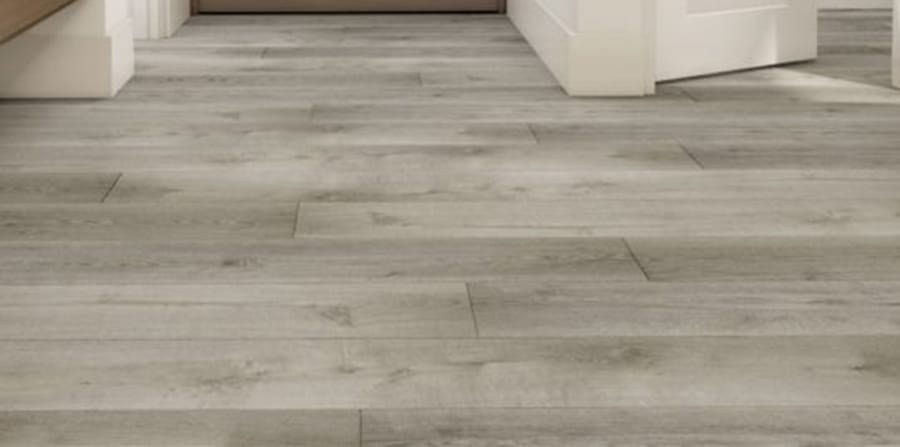
Pros of Luxury Vinyl Plank Flooring
It is important to know the price of vinyl planks and the different costs of luxury vinyl. Recognizing the difference between vinyl plank options helps homeowners choose durable flooring solutions.
To have a smooth flooring experience, consider click-lock installation and how easy it is to install. Evaluating these aspects highlights the advantages of vinyl floors, offering a balanced perspective.
1. Looks Remarkably Similar to Realistic Wood Flooring
One of the best things that vinyl plank flooring has available to us is that it looks like hardwood. Professionals often struggle to distinguish natural wood from vinyl plank flooring.
This is a huge reason why vinyl plank flooring is trendy. For many homeowners, solid hardwood flooring is no longer affordable. Many people love hardwood floors but dislike the upkeep they need for maintenance. Luxury vinyl flooring has beautiful floors that are easy to maintain and unique.
2. Luxury Vinyl is Extremely Affordable
Many people who want to make money by installing vinyl plank flooring focus on low prices. Choosing traditional hardwood flooring would cost you three times more money. Yet, wood flooring can last 100 years or more with proper care.
Wood-look vinyl planks are very family-friendly because of the base material. Depending on the vinyl flooring product, you can expect vinyl plank flooring to cost $2 to $12 per square foot. You can save on labor costs by installing it yourself. Otherwise, labor costs about $1.50 to $6 a square foot for professional installation.
3. It’s Affordable but Does Not Look Cheap
On top of vinyl plank floors looking the same as hardwood floors, they do not look cheap. This makes vinyl plank flooring an excellent addition to your home. These floors can mimic every piece of hardwood that has ever been made possible and even exceed that.
Luxury vinyl flooring has a stylish layer and protective finish. You can customize the appearance. The only limit is what you can imagine to create stunning and creative floors.
4. Durable Floors Stands Up to Kids and Pets
If your lifestyle is hectic, vinyl plank flooring is perfect for active kids and pets. Vinyl plank flooring is affordable and can last 10 to 20 years with proper maintenance. It is durable because it resists water and can withstand a lot of wear and tear from a regular family.
5. Resists Scratches, Dents, and Dings
Vinyl plank flooring is much less prone to scratches. This goes along with being durable, but the reason is the wear layer the company provides. Vinyl plank floors have many layers for better protection over the floors.
The first layer is transparent and protective. It makes the floor durable and prevents scuffs. There are different thicknesses for the wear layers, usually 6, 12, 20, and 28 mils.
Commercial properties usually need 28-mil because of more traffic. Homeowners should get 12 or 20 mil. For homes with less traffic, a 12-mil wear layer is enough. But, for busy households, a 20 mil wear layer is more durable.
6. Known for its Waterproof Qualities
Vinyl plank flooring is great because it’s waterproof and protects wood subfloors in wet areas. This flooring is ideal for laundry rooms, bathrooms, and kitchen areas. It’s also great for foyers and mudrooms.
The difference depends on the type of cosmetics you want for that area. But ultimately, it’s just about appearance. Both products will be water-resistant and durable, no matter the water exposure.
7. Does Not Need An Underlayment
Many floors need underlayment to keep moisture between the subfloor and the flooring. Vinyl plank flooring does not need this because it has an underlayment on the planks.
But this does not mean you cannot have one if you wish to have an underlayment. There are many specific underlays geared towards vinyl plank flooring. Find one that suits your floor needs.
8. Even Novice DIYers Can Install Luxury Vinyl
Vinyl plank flooring is easy to install, especially with the floating floor system. To prevent buckling, leave a 1/4-inch gap between floors and walls.
If you decide to do it independently, read the instructions first to be safe.
9. Messes Are Effortless Cleaning Up
One of the best qualities of vinyl plank flooring is the simple fact that it is effortless to clean up. To make it look nicer, sweep daily with a broom or mop. Use vinegar or cleaner 2-4 times a month.
One of the better ways to maintain cleanliness is to buy a Swiffer or Libman to make your cleaner. Mix 1/4 apple cider vinegar, 3/4 water, and a few drops of dish soap to achieve a cleaner finish. This mixture is affordable and benefits the environment and floors.
10. You Can Remove & Reinstall It
Many homeowners decide to loose-lay their floors or use the floating floor system. This system allows you to remove and reinstall vinyl plank flooring again. These floors are cheap but save you more money in the long run.
Instead of gluing them down, you lay the vinyl planks, which makes them easy to pick up from the subflooring. Don’t worry about them not staying on the floor. It’s harder to move on the ground because of the underlayment beneath the planks.
11. Luxury Vinyl is Comfortable to Walk On
Vinyl plank flooring is not carpet, but it will do very well on your feet. The flooring has underlayment under each plank. Your feet will benefit the most from it.
Adding underlayment for extra foot protection is best if you use concrete as a subfloor. But it’s not necessary. Additionally, an underlayment keeps moisture from the concrete away from the floor. It also helps to maintain a level surface for the flooring, even if the subfloor is not smooth.
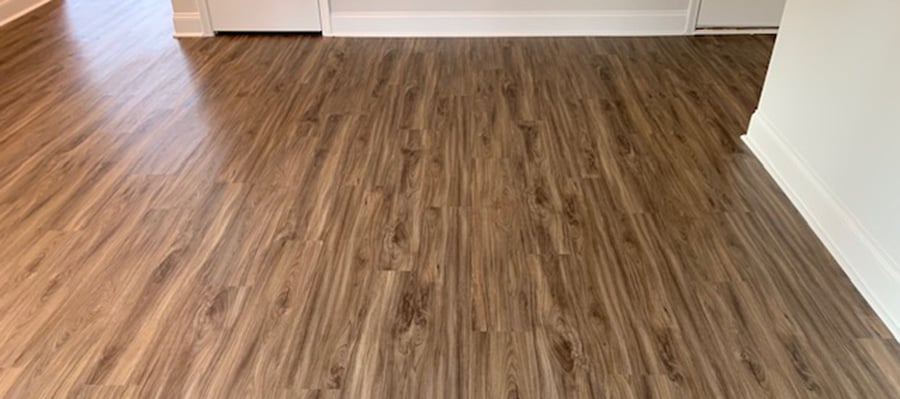
Cons of Luxury Vinyl Plank Flooring
Consider waterproof choices like floating luxury vinyl planks, rigid core, and plank vinyl floors. Being aware of both positives and negatives helps homeowners make informed decisions.
1. Fading can Occur in Direct Sunlight
Over time, vinyl plank floors fade in direct sunlight. This news is the one you do not want to hear. Certain vinyl flooring companies provide UV ray protection, but it might not last. But it does give some help.
This could pose a problem in the future, but it doesn’t mean we can’t find ways to fix it. There are a few things that you can do, such as:
- Put large rugs in front of large windows.
- Place large furniture where the sun will hit the most.
- Install blinds and curtains in your windows.
- Keep the blinds closed.
2. Not Good for the Environment
Vinyl plank flooring is a big problem because it harms the environment. There are quite a few reasons. Vinyl plank floors are made of a strong plastic called PVC, or polyvinyl chloride. PVC is an artificial material that can be heated and molded into pipes, wall coverings, and door sidings.
Why is this dangerous? It harms humans by weakening the heart muscles and causing heart rhythm problems. You can look for vinyl plank flooring that contains non-toxic brands. If you don’t know which route to take, consider Cali Bamboo flooring or Mannington’s low-VOC vinyl flooring. Both are eco-friendly options.
You now may be wondering what VOCs are. After installation, volatile organic compounds (VOCs) release gases into the air. These gases can last for months. This is not good, especially for people with asthma or respiratory issues.
3. Luxury Vinyl is Hard to Recycle
Vinyl plank flooring is difficult to recycle because it has heavy plastic and toxic gases. Note that it is possible but rare to do. These floors cannot be reused, leading to a big environmental problem. This can create more landfills, especially over time.
In the past few years, people worldwide have collaborated to make our homes safer by eliminating fake products. Something vinyl flooring companies can work on is making them more eco-friendly. While it has excellent qualities, you should consider if it’s worth getting because of this problem.
Many homeowners still recycle their vinyl floors, making it between 50 to 100 million pounds of recycled vinyl. Each year’s recycled material makes it only 1/3rd of 1% of PVC building materials produced yearly. Make sure to see if PVC recycling is available in your area because it may not be offered everywhere since it’s not always profitable.
4. Luxury Vinyl may be Hard to Remove
There are two kinds of flooring installation: floating floors and adhesive floors. There is only one installation that is hard to remove.
It can be difficult to uninstall if you use adhesive to install your flooring. The glue you used is likely heavy-duty, making sense as it is difficult to pull up.
If you are wondering what the best way to pry up vinyl plank flooring is, here are some quick and easy steps to show:
- Using a utility knife, make a deep cut into the center of the floor and create an opening with a putty knife.
- Insert the metal blade of the floor scraper into the floor at a 30-degree angle. Then, force the blade into the plank and the subfloor opening.
- Grip the end of the plank with your hands to take it out of the floor.
- Keep doing this with the floor scraper while ensuring not to dig too deep into the subfloor, as this may damage it.
- With vinyl planks that are hard to remove, it is best to use warm water to soften the adhesive to pull them up.
5. May Get Dented from Heavy Furniture
As we have learned earlier, vinyl plank flooring is durable. While it is durable, it’s not impervious to damage. Vinyl plank flooring can get dented or damaged. If a plank becomes damaged, someone may need to replace it.
Vinyl plank flooring is very durable. It can still get indented. Before you buy, be aware that heavy furniture like the couch or recliner can dent vinyl plank flooring.
If the issue persists or the dent is severe, contact your contractor. Consider replacing the plank or leaving it as is.
FIRST WAY:
- Properly clean the area with soap and warm water.
- Heat the area with a blow dryer. Make sure it is not too hot.
- Roll it out with a seam roller.
SECOND WAY:
- Clean the area with soap and warm water.
- Heat a clothing iron on the cotton setting.
- As the iron heats up, grab a towel, damp it, and place it over the dented area.
- Afterward, hover the iron over the towel covering for roughly 2 to 3 minutes. Make sure not to place it directly on the towel.
6. You Can’t Repair or Refinish Luxury Vinyl Flooring
Vinyl plank flooring is often damaged when the floors get scratched. A falling sharp object or furniture could cause a scratch without pads.
The downfall is that it cannot be repaired if the scratch is deep enough and must be replaced. Still, you can improve the floors if the scuff is not as bad as it seems. Here is how:
- First, use soap and warm water, then clean the floor. For deep cleaning, use a sponge to get the nitty-gritty out. Ensure the entire floor is clean with soap and water, then allow it to dry before anything else.
- Sand the scratched area gently using 320-grit sandpaper. After that, use 500 grit and 800 grit for a smoother finish.
- First, make sure the area is soft and smooth. Then, wash it with soap and water. Let it air dry before moving on to the last step.
- In this final step, you will wax the floor with a buffing agent or car wax. Use a soft cloth to buff the waxed area for a shiny finish. It is important to note that you must reapply the wax every few months as it wears off in the flooring area.
7. Material Quality Can Be Inconsistent
Many vinyl plank flooring companies are out there, and some are not very good. This is often due to not using high-quality vinyl during production. Before buying any vinyl floors, you must research to ensure you get the best quality possible. I have Shaw and do not have any issues with it. I love how durable and easy to clean they are.
It is crucial to do your research before buying any vinyl floors. Some of the best quality flooring aside from Shaw are COREtec and Mohawk.
There have been issues reported with some Armstrong flooring products. You can read about those here.
Vinyl Plank Flooring Pros And Cons
Vinyl plank flooring offers several advantages, including durability, water resistance, and easy installation. It is also a cost-effective option and comes in a variety of styles. Vinyl plank flooring has a few downsides. It can get scratched easily and fade in sunlight. Also, its resale value is limited.
Is Luxury Vinyl Flooring Worth it?
While some may choose vinyl plank flooring, it’s important to note that it’s not real wood. They may look and feel natural, but this will never change. Vinyl plank floors don’t last as long as hardwood floors. Hardwood floors can last for centuries if protected and cared for properly.
Hardwood floors have a better resale value than luxury vinyl plank (LVP). LVP usually needs replacement in 7 to 12 years due to wear on the protective layer. This depends on factors like foot traffic.
There are many ways you can continue to keep your floors in top-notch shapes, such as:
- If possible, create lower traffic. Some households may be unable to do this due to being extremely busy, but don’t worry; there are other ways.
- Clean up spills reasonably quickly. Classic vinyl flooring is waterproof, but water won’t seep through the cracks and cause mold. One way to avoid this issue is not to allow the small water pool to linger on the floors.
- Sweep up dirt, grime, and old food. Older food tends to harden, increasing the risk of potential scratches from these objects. A quick sweep once a day is more than enough to keep the floors in better shape.
- Keep furniture pads underneath any appliances or furnishing.
- When moving furniture, lift the heavy-duty movable items off the floor.
- Use a cleaner specifically designed for vinyl plank flooring.
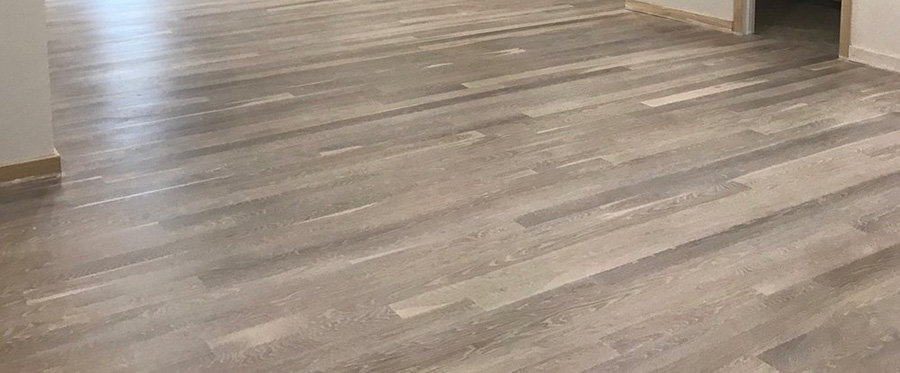
Vinyl Plank Flooring FAQs
What are the disadvantages of vinyl plank flooring?
Vinyl plank flooring is versatile but has drawbacks. It’s prone to dents, not biodegradable, emits VOCs, and fades in sunlight. Extreme temperatures can affect it, and it lacks the natural beauty of real wood. While it resists water, it’s not entirely waterproof and can be challenging to fix without affecting nearby areas.
Which is better, laminate or vinyl plank?
Laminate and vinyl plank flooring have distinct features. Laminate mimics natural materials and is scratch-resistant but prone to water damage. Vinyl plank looks like wood, bends easily, resists water, and works well in wet places. Installation methods vary.
Is vinyl plank flooring a good idea?
Vinyl plank flooring is a good option for homeowners who want affordable, durable floors that resist water. Before installing the flooring, consider the advantages and drawbacks of the space it will be in.
How much does it cost to install 1000 square feet of LVP floors?
The cost of installing luxury vinyl plank (LVP) flooring can vary. It depends on the quality of the vinyl, labor, and other services. LVP prices range from $1 to $10 per sq ft. Labor costs $1 to $3 per sq ft. Underlayment and subfloor work will increase the total cost. For 1000 sq ft, total expenses range from $3,500 to $12,000.
Does LVP Scratch Easily?
LVP is more scratch-resistant than the hardwood but not more so than the laminate. LVP is softer and has a protective layer, so it doesn’t scratch as easily as hardwood or engineered wood flooring. Laminate flooring has a protective coating, making it resistant to scratches. It’s better than LVP and wood.
Conclusion
There are many advantages and disadvantages to vinyl plank flooring. When considering vinyl plank flooring, installation methods ensure secure installation. The wood comes in different colors and has a textured surface that resists scratches. The product details show that it’s good for homes with pets. It also has a waterproof option. Despite its benefits, vinyl plank flooring varies in life expectancy.
When buying vinyl plank flooring, research the available colors and forms. Explore options like floating, waterproof, and stick luxury vinyl plank flooring. Understand how flexible vinyl forms can meet your needs to make the right choice.


